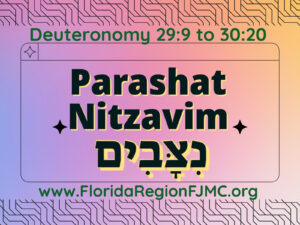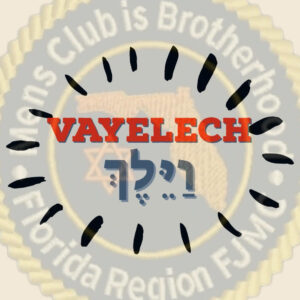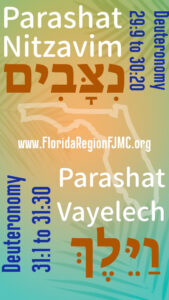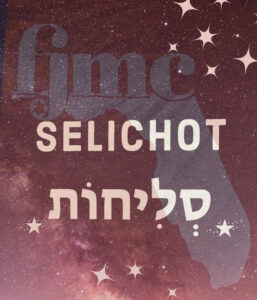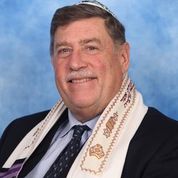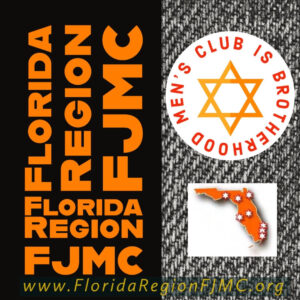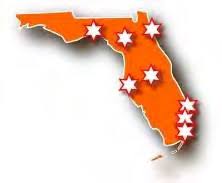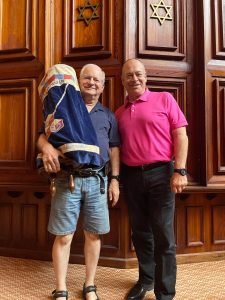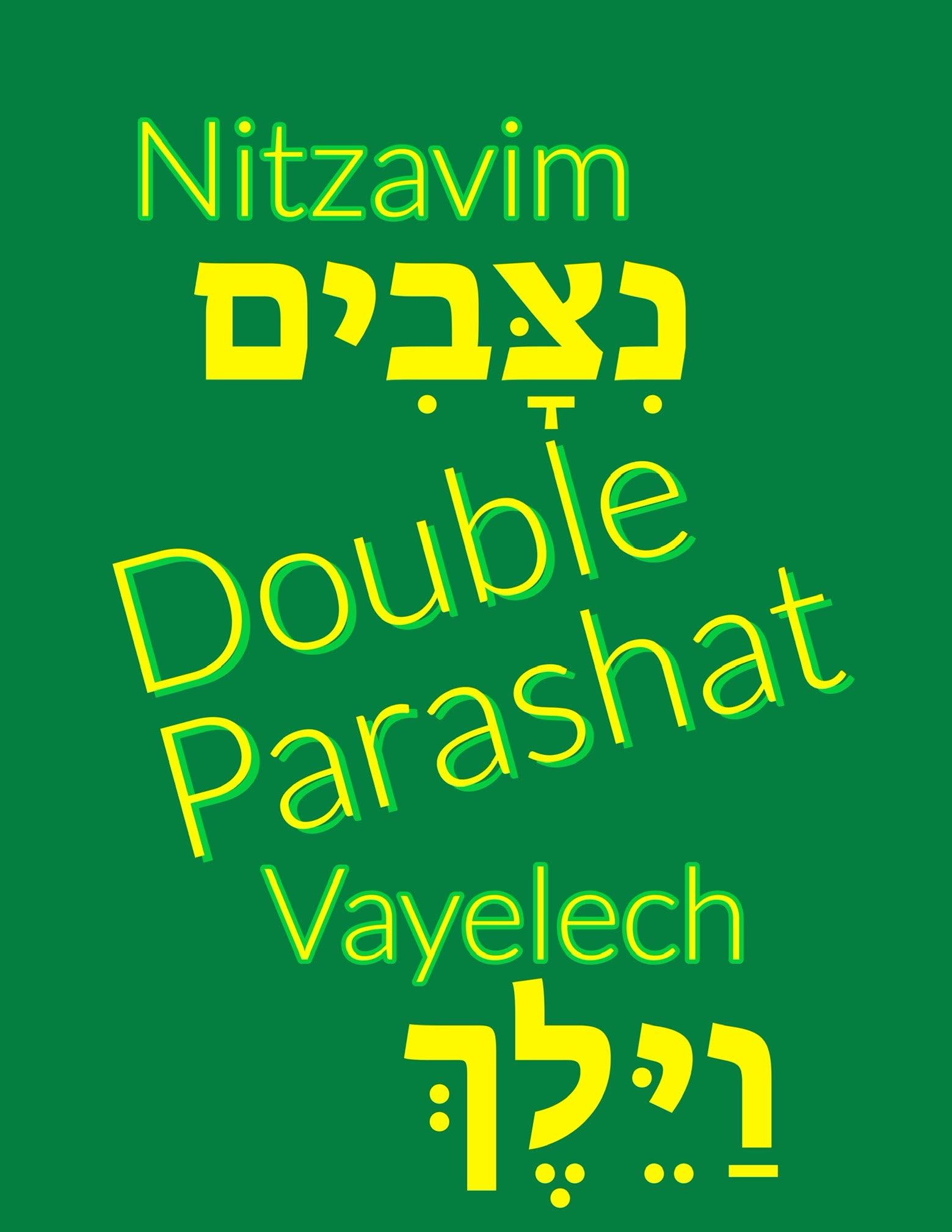
When you Choose Shabbat, you choose to learn that every Shabbat is different and special. This week I learned about Parashat Nitzavim (נִצָּבִים) and Parashat Vayelech (וַיֵּלֶךְ), the 51st and 52ndh weekly Torah portions in the annual cycle of Torah readings.
I also learned that the lunisolar Hebrew calendar contains up to 55 weeks, the exact number varying between 50 in common years and 54 or 55 in leap years. According to Wikipedia, in some years (next in 2025), Parashah Nitzavim is read separately. In other years (like 2023, 2024, 2026, and 2027), Parashah Nitzavim is usually combined with the next parashah, Vayelech, to help achieve the number of weekly readings needed. However, if two Sabbaths fall between Rosh Hashanah and Sukkot and neither Sabbath coincides with a Holy Day, then Nitzavim and Vayelech are read separately.
According to Wikipedia, Nitzavim (נִצָּבִים), Deuteronomy 29:9 through 30:30, contains 2,123 Hebrew letters, 553 words, 40 verses and makes up 72 lines of the Torah scroll. Nitzavim may be small however it carries a big message; Moses tells the Israelites they have a choice between life and death, blessing and curse, and he exhorts them to choose life by loving G-d and heeding His commandments.
In contrast, Vayelech (וַיֵּלֶךְ), Deuteronomy 31:1 through 31:30, contains 5,652 Hebrew letters, 1,484 words, 30 verses and makes up 112 lines of the Torah scroll, giving it the distinction of having the fewest verses of any Parashah in the Torah. In Vayelech, Moses tells the Israelites to be strong and courageous as G-d and Joshua will soon lead them into the Promised Land. The reading also foreshadows the death of Moses.
Rabbi Michael D Klein of Temple Torat Emet offers his insights on this week’s double Torah reading, Nitzavim and Vayelech:
“It is appropriate that this weeks Torah portions are called Nitzavim (approaching) and Vayelech (and he went) . We are indeed approaching the Yomim Noraim; a period of time each year when we ask G-d to inscribe and seal us for a happy, healthy, and successful year. We hope that wherever we go this year will bring us and our family and community closer to G-d and the Torah.
Moses asks everyone in Klal Yisroel to approach and heed his words as he is about to ascend the mountain for the final time. All are assembled, from the wood cutter to the water gatherer. This teaches us that in G-d’s eyes we are all equally responsible and privileged to hear, to learn, and to apply the Torah’s teachings.
In the Torah readings of Rosh Hashanah, we will hear that, just as Avraham and Sarah were called upon by G-d to make a sacrifice, so we in every generation are likewise called to sacrifice and renew the Covenant for ourselves. We accomplish this by going forth (Vayelech) and spreading Mitzvot in the world wherever we go.
The messages in the Torah readings for Yom Kippur tell us that ritual, service and moral behavior are all part of the same ethic. We are all equal in how we approach G-d and regardless of our station in life, we have the opportunity to live our lives in a G-dly way. May the Selichot prayers that we recite bring us the realization that everyone can approach the heavenly throne on equal footing based on our words and our deeds. May G-d guide us on the correct path to love, good health, spirituality and achievement in the coming year 5784.
- What does this portion teach us about the value of labor and work?
- How would you summarize Moses’ final discourse?
- Moses’ final discourse is the poetry in Haazinu. How are these portions a preamble to this?
- How do these portions represent a renewal of the covenant?“
Rabbi Michael D. Klein attended Yeshiva College of South Florida and served as Torah Reader, Hebrew teacher, Chazzan and spiritual leader of various synagogues throughout South Florida. In January 2015 he became Ritual Director, Bnai/Bnot Mitzvah instructor and 7th grade Hebrew instructor for Temple Torat Emet of Boynton Beach. In October 2019 he was accepted into an accelerated track and received his shicha from Yeshiva Adath Wolkowisk and has been the Rabbinic leadership of Temple Torat Emet since August 2020. In September of 2022 he was appointed Rabbinic and Spiritual Advisor of the Florida Region of FJMC.
Choose Shabbat; choose to celebrate, to light candles, sing songs and learn a little Torah.
This moment of Jewish Learning is brought to you by the Florida Region of the Federation of Jewish Men’s Clubs (FJMC). We are part of a confederation of over 200 Jewish Men’s Clubs and Brotherhoods representing over 20,000 members across the United States, Canada, Latin America, and beyond. Learn more about how your Jewish Men’s Club or Brotherhood can affiliate with the FJMC at: https://www.fjmc.org/content/affiliating-fjmc.
The Florida Region of FJMC serves the needs of affiliated Men’s Clubs and Brotherhoods throughout the State of Florida. Get to know more about the FJMC Florida Region and our growing network of Jewish Men’s Clubs and Brotherhoods at www.floridaregionfjmc.org and please visit and LIKE our Florida Region FJMC Facebook Group at www.facebook.com/FloridaRegionFJMC.
